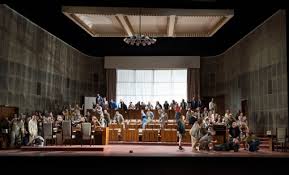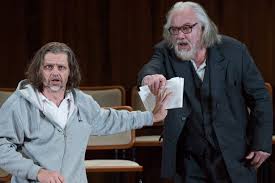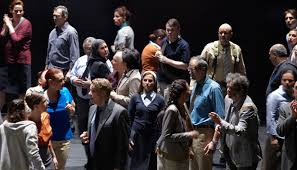 Perhaps the most pertinent article in the programme book to accompany the Faith performances this summer was by Karen Armstrong who argued perceptively on the difference between faith and belief. The two operas which WNO are currently staging – to be joined shortly by two versions of Edgar Alan Poe’s Fall of the House of Usher – are both deeply concerned with the dichotomy which any religion faces of making practical decisions on the basis of spiritual or numinous understanding.
Perhaps the most pertinent article in the programme book to accompany the Faith performances this summer was by Karen Armstrong who argued perceptively on the difference between faith and belief. The two operas which WNO are currently staging – to be joined shortly by two versions of Edgar Alan Poe’s Fall of the House of Usher – are both deeply concerned with the dichotomy which any religion faces of making practical decisions on the basis of spiritual or numinous understanding.
Schoenberg’s masterpiece Moses und Aron has waited far too long for another professional staging in Britain. We were at the first performances at the Royal Opera House in 1965 in the staging by Peter Hall under Sir Georg Solti, and they made an indelible impression. Thankfully the new staging by Jossi Wieler and Sergio Morabito, while radically refocussing the work in the modern world, manages to maintain the spiritual complexity of the composition and the constant dilemma for both Moses and Aron.
Where a conventional staging might have given us a more ethereal visual image we are here presented with a strongly naturalistic world within which any spiritual forces will have to fight for acceptance. John Tomlinson’s magnificently troubled Moses is constantly out of place with his tantalising glimpses of the unseen god – a god whom the more practical Aron wants to accept but at the same time wants to make more easily accessible to the people around him. Sacrifices, action, prayers and hymns are far easier than trying to deal with an unseen, undetectable, omnipresent god.
While Moses is present the action remains focussed on the tight dialogue between Moses and Aron. However, as soon as he leaves to meet with god, the situation rapidly falls apart.
In the second act Aron gives in to the demands of the people and shows them a film. We only get to judge its content through the lengthy reactions of the chorus. I doubt if the chorus have ever been as challenged as they were here, but their responses, individually and collectively were utterly convincing. The worship of the golden calf becomes an excuse for a breakdown in any moral authority. It is as if, with no strong leadership, they are incapable of maintaining any moral authority for themselves.
Schoenberg was unable to complete the planned third act and the work ends with Moses great cry of despair as he realises he will never be able to turn his vision into words – or words which can have any practical reality.
Mark Le Brocq took over at short notice as Aron, and his finely honed characterisation, together with a virile but lyrical approach to the score made for an exceptionally convincing reading. The large number of smaller parts were all cast from strength and the chorus was on better form that I can recall. The score is extremely difficult but they sang it as if it were the easiest operetta.
Lothar Koenigs maintained a tight grip of the many groups involved, particularly the off-stage forces, and the whole was so smooth one had to recall how difficult a work this actually is to bring off.
I would love to think we might see it again.
The following night was the first night of a new production of Nabucco. Rudolf Frey had made a good job of Maria Stuarda last year so there was nothing to prepare us for the staging we actually experienced. I felt sorry for the many strong soloists whom WNO had drawn together. For much of the evening, if you closed your eyes, the music was fine. Open them and things could go very nastily awry, even if one was not reduced to outright laughter – as happened to some around me.
An empty black box was gradually peopled by a chorus in modern dress who wandered aimlessly about until the singing started. It was unclear who they were or where they were. According to the normal narrative line they were Hebrews, but there was little indication of this. A few men wore kippahs but most did not. There was even one obviously Muslim women who drew attention to herself by walking with a limp – but she disappeared after the interval.
Once we got to Babylon the vast stage area was surrounded by gold lame curtains, and when Abigaille became enthusiastic about gaining the throne, the stage looked like something out of Britain’s Got Talent. Singers frequently walked around carrying chairs for little apparent reason. Wherever possible, the director opted for the most obvious of clichés, with Nabucco as a South American dictator and the spies all carrying ammunition slings.
In addition the lighting was deliberately expressionist, switching drastically to change the point of focus, all of which was distracting to the action and particularly to the music.
Xian Zhang conducted with flair and brought considerable enthusiasm to the pacing of the evening, and the chorus were as good as they had been the night before for Moses und Aron. Kevin Short was a strong Zaccaria though the hand-jive did not suite him. Robyn Lyn Evans has a fine lyrical tenor for Ismaele but was required to perform like Brad from the Rocky Horror Show and Mary Elizabeth Williams was a confusing Abigaille. The voice is large and powerful but her mannerisms became annoying and her insistence on turning everything into a comic act meant we had no sympathy for her at the end and her death scene went for little.
Hopefully the two Poe settings will bring us back to the fine standards of Moses und Aron and we can quietly overlook Nabucco.


